Opinion
PARIS 2024: FORGING AHEAD AMID YESTERDAY’S FAILURES
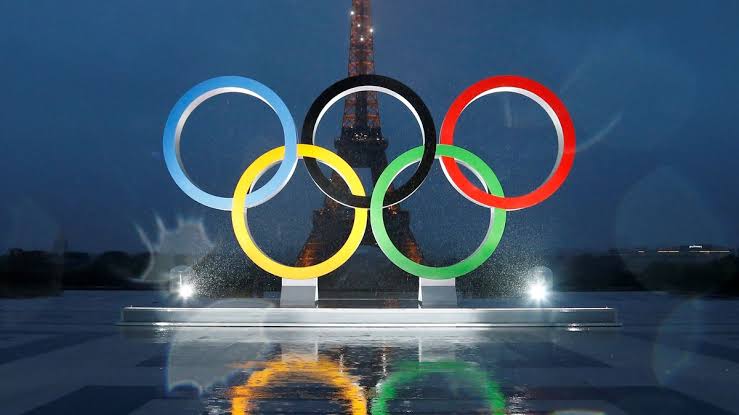
BY BOLAJI AFOLABI
So, after about four weeks in Paris, Team Nigeria which participated in close to a dozen sports with about 90 athletes, came back “empty handed.” It became obvious that the two weeks training in Germany was grossly inadequate to win medals. Only few of the over-30 sports federations registered their presence at the Olympics, majority of them only visible by name. Somehow, the team’s superlative achievements at the All African Games held in Ghana, few months back where they came second out of over 50 countries was flattering. Same as the African Athletics Championship in Cameroun, where Tobi Amusan and others had to travel by road. Not winning any medal was bad, but having countries including Kenya, Algeria, Cote D’Ivoire, Zambia, and Ethiopia in “Africa’s Top 10” ahead of Nigeria is worse.
Being a country that is super-passionate about sports, the preponderance of reactions by people is expected. That Nigeria has only won about 10 medals in almost 30 years of participation in the past seven Olympics speaks volumes. After every four years, from the Atlanta games to other previous host-cities and Paris, it has been the same rhythm and lyrics. A deluge of blame-games, huffing and puffing, as well as unintended promises fills the airwaves. They are also splashed on the pages of the newspapers. In one or two instances, sports administrators, technocrats, and stakeholders are herded into “talk-shops” to review, and proffer strategies for the “way forward.” Often times, nothing concrete is achieved.
As a nation, it has become necessary to wean ourselves from the four-yearly circus show of global failure and frailties. We have to, this time be truthful to ourselves. We have been unfair to the career progression and development of our youths. The Paris showing is a wake up call to critical stakeholders in sports, federal government, and Nigerians in general. The dismal outing could turn out to be a blessing because it is only when we rise from failure and falling that we discover the true strength within. Taking full responsibility for the Paris failure, and promising to chart a new, different, and results-yielding cause for sports development, Minister John Enoh may have provided the required lead for audacious change in the sector.
Indeed, within the sporting fraternity, there are vagaries of opinion about Team Nigeria’s performances at the Paris games. A school of thought strongly believes it was “the worst in our Olympics history.” Another counters by insisting that there are hopes for the future. Yet, a different group counselled that Nigeria should leverage on the opportunities and possibilities embedded in failures and adversities. They admonished people to look at the cup half full and not half empty. As a people with strong passion for sports development, Nigeria deserves pragmatic strategies anchored on time-specific, objective-driven, and vision-yielding templates. One of the potent keys towards this is to identify and play-up the positives recorded in Paris.
Yes, Team Nigeria did not win medals but the performances of some of our athletes has attracted global attention and recognition. Few days after the Paris Olympics, some athletes have gone up the ladder in their respective sports in the latest World Athletics, (WA) rankings. Favour Ofili, Africa’s top-most in 200 metres women placed 6th in Paris, has moved from 31st to 8th position. Eighteen years old Samuel Ogazi, who is currently 3rd in Africa, became the first Nigerian to get to Olympics finals in 400 metres men at the Paris games after Innocent Egbunike in Seoul 1988, is now 12th from 23rd in the world. Chukwuebuka Enekwechi, two-time African champion in Shot Put men is rated seventh. Few others including Ruth Osoro, Prestine Ochonogor, Konyinsola Ajayi, Favour Ashe, and Utsheoritse Itsekiri got moderate uplifts in the WA rankings. Top athletes including Tobi Amusan who did not make the 110 metres hurdles final but her 12.55 seconds was not a waste as she is now 5th in WA rankings; and Ese Brume in the Long Jump women.
At the Paris Olympics, Anuoluwapo Opeyemi’s records in Handball men emerging the first African to get to the 2nd round, as well as being the first African to qualify for two consecutive Olympics is no small feat. Not forgetting the quantum leap of D’Tigress in Female International Basketball Association, (FIBA) rankings courtesy of beating two Top-5 teams, Australia and Canada, qualifying for the Quarter finals; first by any African country – male and female where they lost to eventual gold medalist, United States of America. How about the gallantry of Blessing Oborududu, Adekuroye, and other colleagues in Wrestling? These are positives that can be properly harnessed, strongly positioned, and carefully nurtured to global recognitions in few years. Not holding brief for sports officials, administrators, and government it is foolhardy to expect a nation that spends paltry 9 billion naira; about $30m and it’s lack of preparation, organisational ineptitude, and administrative inefficiencies to be at par (or close to) Great Britain and South Africa that expended about $330m and $300m respectively.
While one commends Enoh for taking a position otherwise alien to public service, and abominable to most Nigerians in leadership positions, it is imperative he receives the support of stakeholders in the sporting sector. They need him to “walk the talk.” Sports enthusiasts and technocrats want him to do this with uncommon alacrity. The African proverb that you need two hands to lift a heavy luggage is better exemplified in weightlifting. Since the sports sector is now in the “surgery theatre” Enoh must swiftly, and speedily reach out to relevant government agencies, organised private sector, diplomatic corps, state governments, and philanthropists for reasonable and realistic partnership.
Growing up, the writer recalls the massive involvement of the military and police force in sports development. They had teams and individuals in football, athletics, boxing, and few other sports who participated in national, regional, and global competitions. It is heart warming that para-military services including the Nigerian Police, the Customs, Immigrations, Prisons, Road Safety Corps, Civil Defence, and the Fire agency are continuing in similar direction. These agencies are strong in Volleyball, Handball, Boxing, and Athletics. As coordinating ministry for national sports development, Enoh must galvanise his team towards proper synergy and collaboration with these services, and the military.
In times past, the private sector played leading roles in the promotion and development of sports. Some corporate organisations were involved in talent discoveries, and grassroots development. One cannot forget Unipetrol’s sponsorship of the “Clay Court” competitions in Kaduna and Kano which attracted the best lawn tennis players from around the world. Same with the “Ogbe Clay Court” in Benin City, and others in Enugu and Port Harcourt which were bankrolled by corporate organisations. The “Lord Rumens” tennis competition sponsored by a philanthropist cannot be forgotten. The “Shell Cup” football competition for secondary schools, and Mobil Oil sponsored “Nigerian Open” for athletics readily comes to mind. Enoh must ensure that these and many others that were production-nurseries for athletes are revived, nurtured, and deepened.
Prioritisation in the realisation of set objectives is paramount. As Enoh embarks on veritable partnership and robust collaboration in sports development, it is germane that focus should be on sports that Nigeria has comparative advantage over many other nations, and has realistic chances of winning medals at competitions. True, table tennis has produced, from one generation to the other players who rose to become world-beaters. As evidenced at the last three Olympics, China has shown consistent near-dominance. How about making Chinese firms operating in Nigeria to either underwrite the salaries and allowances of coaches employed from China? Foot the bills of yearly refresher courses for our local coaches in China? Adopt few of our players, yearly and pick-up training bills and other allowances? These and more can be the company’s corporate social responsibility, (CSR). Same for weightlifting.
From empirical evidence, boxing remains one of our strong sports. Giving Uzbekistan brilliant performances in Paris, similar model above can be explored. In swimming, with the humongous revenue generated by MTN, and other South African companies operating in Nigeria, there can be partnership to develop swimming; which is a multi-medal sport. We can explore similar initiative for basketball, athletics, handball, volleyball, and few others. Fact is, there are bright sides to Nigeria’s blues at the Paris Olympics. If and when Enoh embarks on this long, tortuous but eventually fulfilling journey, he must be brutally frank, bold, and courageous in decision-making. Knowing that sports-loving Nigerians would be with him, he should be free, fair, transparent, and sincere at all times in leadership changes at the sports federations. More importantly, he should ensure the weeding of “strongholds” that have held down sports development; this is corollary to the success or otherwise of any noble intention he has.
BOLAJI AFOLABI, a development communications specialist was with the Office of Public Affairs in The Presidency.
Opinion
5G,IoT and AI to boost global GDP by 2030

By Sonny Aragba-Akpore
With Mobile technologies and services now generating around 5.8% of global Gross Domestic Product (GDP) a contribution that amounts to about $6.5 trillion of economic value, there are strong projections that by 2030, this figure will rise to almost $11 trillion, or 8.4% of GDP.
Global System of Mobile Communications Association (GSMA) says much of this will be driven by countries around the world increasingly benefiting from the improvements in productivity and efficiency brought about by the increased take-up of mobile services and digital technologies, including 5G, Internet of Things (IoT) and Artificial Intelligence (AI).
The GSMA recently introduced the 5G Connectivity Index to provide insights into 5G performance in 39 markets in order to encourage informed decision-making.
In terms of Economic Impact,
the GSMA emphasizes the economic benefits of mobile technologies and services, including 5G, projecting that they will contribute significantly to GDP growth by 2030.
“The GSMA provides specific reports and analyses on 5G in different regions, such as Sub-Saharan Africa, Asia ,Middle East among others highlighting the progress and challenges of 5G deployment in specific areas.”
In Sub Saharan Africa for instance with particular attention on Nigeria,South Africa,Egypt,Kenya and Botswana among others some measure of progress in deployment has been recorded.
The rollout of 5G has brought immense benefits across multiple industry sectors, particularly those involving internet of things (IoT) and artificial intelligence (AI) applications in which the real-time transfer of data is crucial.
More broadly, the adoption of 5G is expected to accompany increased data use across the globe, with forecasts anticipating mobile data traffic of over 300 exabytes per month by 2030, more than twice the volume consumed in 2024 according to Statista.
And with a third of global population expected to be covered by this fifth generation (5G) networks ,a technology that has defined new ways of communication by 2025 ,GSMA
says the technology has surpassed growth projections of all times.
“5G subscriptions increased by 163 million during the third quarter 2024 to total 2.1 billion. 5G subscriptions reached close to 2.3 billion by the end of 2024 accounting for more than 25 percent of all global mobile subscriptions.
“4G subscriptions continue to decline as subscribers migrate to 5G” according to GSMA.
As of the first quarter of 2024, there were nearly two billion 5G connections worldwide, with 185 million new additions. This is expected to grow to 7.7 billion by 2028.”
Statistics show that 5G is the fastest-growing mobile broadband technology, reaching 1.5 billion connections by the end of 2023.
It only took four years to reach this number, compared to 10 years for 3G and more than five years for 4G.
“5G is more than a new generation of technologies; it denotes a new era in which connectivity will become increasingly fluid and flexible.5G Networks will adapt to applications and performance will be tailored precisely to the needs of the user” GSMA submits.
By covering one-third of the world’s population , impact on the mobile industry and its customers will be profound according to GSMA.
To deepen the spread of 5G ,GSMA is working closely with the mobile operators pioneering 5G, “by engaging with governments, vertical industries including automotive, financial services, healthcare providers, transport operators, utilities and other industry sectors to develop business cases for 5G.”
And In order to accelerate the growth and spread, many operators are said to be deploying
AI technology as part of an integral part of telecoms operators’ strategic and operational plans.
“Operators are making important advancements in the deployment of AI technology, which is serving as a transformative force shaping the telecoms industry. By deploying autonomous AI-based systems, operators can enhance operational efficiency, customer satisfaction and security, while also creating new revenue opportunities”.
China, South Korea, the United Kingdom, Germany, and the United States are the leading countries with robust 5G coverage in the world.
Since the first commercial launches of the fifth generation of mobile networks in late 2018, these five countries have emerged as leaders because multiple companies in these countries have deployed networks and are selling compatible devices. Countries including Switzerland and Finland are up and comers in 5G development, though they have limited deployment.
In China there are three Companies leading in deployment.
The world’s largest 5G network was launched by the three largest Chinese network operators Oct 31, 2019, according to the state-run news agency Xinhua. These are China Mobile, China Unicom, and China Telecom which all activated their networks in less than five months after they were issued 5G licenses.
Each of the network operators offered their 5G services at $18 per month in 50 Chinese cities at the beginning of the launch.
GSMA expects 36% of China’s mobile users to be using 5G by 2025. That’s about 600 million subscribers, who would also make up 40% of the entire global 5G market by this year.
This is all despite efforts made by the United States government to hamper the progress of Chinese vendors, though those efforts may affect how Chinese companies may expand into the global market.
In South Korea,SK Telecom and Korea Telecom run as the main competitors for the South Korean 5G market.
SK Telecom acquired spectrum in the 3.5 GHz and 28 GHz frequencies to prepare for deploying 5G.
In April of 2019, the Enterprise claimed to be the first mobile carrier in the world to launch 5G services to work on 5G smartphones. SK Telecom asserted an edge over rival Verizon, as the former launched 5G services available at the same time as Samsung Galaxy S10 5G smartphone launched in South Korea. Verizon launched mobile 5G services in the U.S. before a 5G enabled smartphone was available to U.S. consumers.
SK Telecom also conducted tests with a 5G Standalone (SA) Core (a core not reliant on the 4G network) for their 5G network in cooperation with Samsung Electronics.
The world’s largest 5G network was launched by the three largest Chinese network operators Oct 31, 2019, according to the state-run news agency Xinhua. These are China Mobile, China Unicom, and China Telecom which all activated their networks in less than five months after they were issued 5G licenses. Each of the network operators offered their 5G services at $18 per month in 50 Chinese cities at the beginning of the launch.
“What we are seeing is a concerted effort by the Chinese — the operators, vendors, and government regulators — to deploy 5G as quickly as possible,” Chris Nicoll, principal analyst at ACG Research, pointed this out in a November 1, 2019 SDxCentral article.
With all of these players working together, the three network operators had collectively deployed nearly 86,000 5G base stations peaked over 130,000 by the end of 2019. The latter number breaks down into China Unicom and China telecom, with each planning to install 40,000 base stations, and the market leader China Mobile to install 50,000.This was the projection by 2019 but they have since overshot this by the beginning of 2024.
The International Telecommunication Union (ITU), says 5G coverage reached 40% of the world’s population in 2023 with an uneven coverage and distribution with developed countries having more coverage than low-income countries:
In Europe ,68% of the population is covered and
Americas had 59% of the population covered while
Asia-Pacific has 42% of the population covered as at 2023.
Arab States have 12% of the population covered.
Commonwealth Independent of States (CIS) had 8% of the population covered.
ITU figures show Africa,s coverage rose to 10 % of the population by 2023 .
The ITU also notes that 90% of the world’s population is covered by 4G, but 55% of people without access to 4G live in low-income countries because In low-income countries, 3G is often the only technology available to connect to the Internet.
The ITU develops and adopts international regulations and global standards to enable the harmonization and implementation of broadband mobile networks.
In Africa, around a dozen nations have launched services including Botswana, Kenya, Mauritius, Madagascar, Nigeria, Seychelles, South Africa, Tanzania, Togo, Zimbabwe, and Zambia but Africa is a patchwork of 54 countries.
And penetration is predicted to be slow.
By 2027, Ericsson predicts that 80 percent of phone users in Europe will have 5G service.
At the same time, 5G subscriptions in Africa, home to 1.4 billion people, May stagnate at a little over 10 percent. Why will so few people in Africa get access to 5G services?
China, South Korea, the United Kingdom, Germany, and the United States remain the leading countries with robust 5G coverage in the world.
While many countries are already providing robust services,Africa remains on the outskirts of 5G services.
The countries in Africa that have launched 5G networks, include South Africa with its roll out
In March 2022, when the Independent Communications Authority of South Africa (ICASA) sold spectrum across several bands.
In Nigeria,MTN rolled out commercial 5G services in Lagos in 2022, with other roll out in Abuja, Port Harcourt, Ibadan, Kano, Owerri, and Maiduguri among others.
MTN Congo announced that it was the first country in Central Africa to deploy 5G.
In Botswana Orange deployed 5G technology to provide new services in the Gaborone and Francistown regions.
Other countries in Africa that have launched 5G Fixed Wireless Access (FWA) services include: Angola, Kenya, Zambia, and Zimbabwe.
Analysts say “5G’s potential is growing due to its ability to deliver fiber-like speeds. However, there are still challenges in the region, such as:
Urban areas are reaching their maximum capacity whereas a large portion of the population lives in rural areas.
This explains why 5G adoption in the sub-Saharan region is currently below six percent “
Analysts report that 5G deployment in Africa faces many challenges, including Spectrum assignment,regulatory issues,infrastructure,security,financial resources among others.
“Spectrum is a limited resource that is already in use by other services, such as TV broadcasters and satellite operators. Governments need to open up frequencies and grant 5G licenses at reasonable prices. “
Infrastructure is another major challenge.
“5G networks require a large initial investment, including expensive devices, antennas, and Radio Access Network (RAN) hardware. The infrastructure needs to be fiberized to support 5G services.
Regulatory conditions also serve as challenges to deployment.
For instance “regulatory authorities may not have started the process for licensing and granting frequencies in the right portion “
“Most of the equipment and devices required for 5G deployment need to be imported.”
There are also security challenges that make
5G technology vulnerable to cyber security threats, such as tracking calls and exposing user locations.
Opinion
Right of Reply: THE PUNCH AND BUSYBODY BUSINESS

The recent declaration of a State of Emergency in Rivers State has triggered diverse commentaries from a wide range of Nigerians.
Almost everyone hailed the presidential proclamation because of the visible threat to law and order in the state at the time the action was taken. Of course, there were a few naysayers who read political meanings into an otherwise sincere and prompt intervention.
One such negative interpretation is the position taken by the Editorial Board of The Punch newspaper. In one of its editorials published on the matter, the national daily claimed that the entire crisis was caused by what it described as “the needless meddlesomeness in the governance of the state by its former governor and Tinubu’s Federal Capital Territory Minister, Nyesom Wike….” It is unfortunate that this narrative and others like it have become commonplace in the media space.
How did the Editorial Board of a reputable newspaper arrive at such a conclusion? Their claim that the Sole Administrator, Admiral Ibok Ete Ibas (rtd), has been acting a script purportedly written by the Minister of the Federal Capital Territory, Nyesom Wike, is also faulty and has no iota of truth.
They also faulted the sacking of all political appointees who served in Governor Siminalayi Fubara’s administration, insinuating that their replacements were drawn from Wike’s political camp. Again, nothing can be further from the truth.
Since his appointment as the Sole Administrator of Rivers State, Admiral Ibok Ete Ibas has been running the state with the abundant human resources available in the state and has not imported anybody from outside the state. Did the Editors of The Punch really expect him to run the administration with the politicians loyal to the suspended governor?
Do they not know that the crop of political appointees who served Fubara would have found it difficult to work with the Sole Administrator?
Certainly, they know the truth, but they have chosen to stoke the fire to generate more tensions in Rivers State.
Certain interests might have commissioned this editorial to cast aspersions on the Sole Administrator and raise doubts about his capacity to run the state.
It may also have been the handiwork of Wike’s political detractors, the man whom many politicians love to hate for no other reason than envy and jealousy.
We urge the Punch newspapers to seek a better mode of intervention in the political situation and not dwell on innuendos and unsubstantiated allegations against certain political actors in order to blackmail them.
Dr Ike Odogwu
Opinion
“Chief. Dr. Ekuogbe Akpodiete; A Philanthropist, Lawyer, and Statesman”
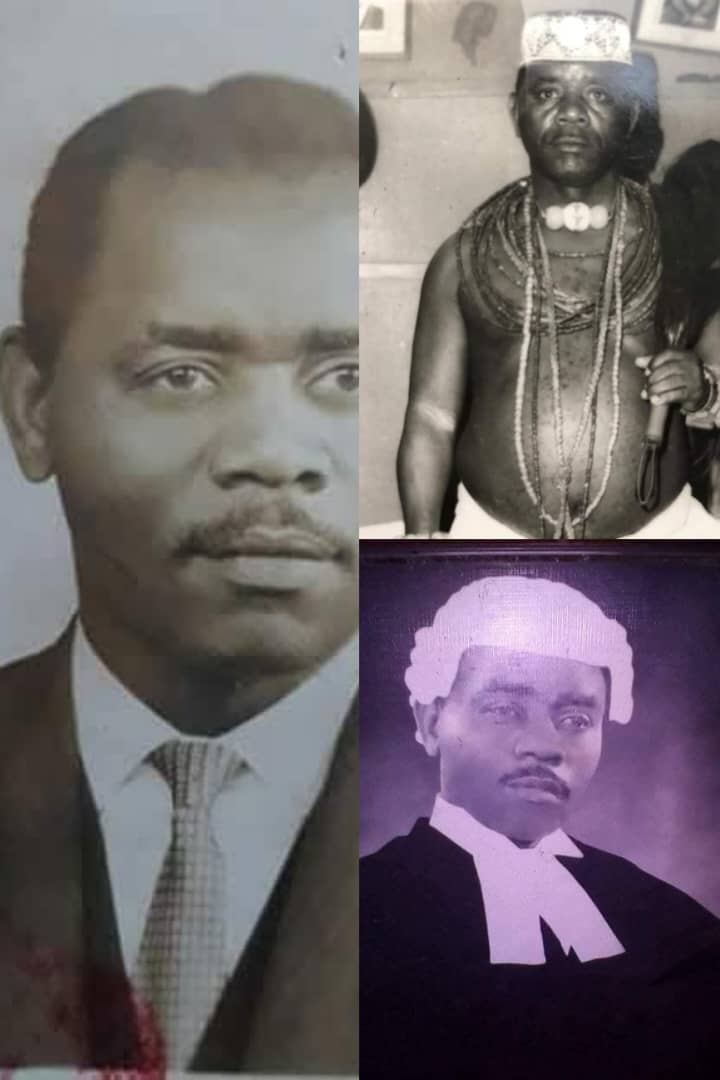
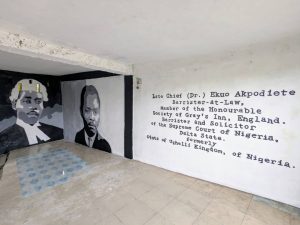
In a life of achievement, Chief Ekuogbe Akpodiete popularly called the Duke by his contemporaries in the UK was an assessment clerk, post office clerk, a court interpreter, an educationist, a business man, a political party chieftain, a Barrister and Solicitor, a Magistrate, the Otota (the Prime Minister) of Ughelli kingdom which is the highest traditional chieftaincy office that underpin the royal office of the Ovie of Ughelli Kingdom.
He was a trail blazer, a strict disciplinarian, a lover of people, and a philantropist. He saw to it that people lived in peace and happiness.
Born on the 4th of April, 1924, to parents cut from an industrious mould, Chief Ekuogbe Rowland Gregory Akpodiete took zealously to education that neither his mother Ughweriaka who was a trader, nor his father Akpodiete who was a farmer had.
He attended the Native Authority Primary School, Ughelli, and Enitona High School, Port Harcourt, for his secondary school education.
He thereafter had a brief teaching career in primary schools in Ofuoma near Ughelli, he worked as a process clerk in the then Sapele Township Department between 1950 and 1953, serving at the same time as an interpreter in the local courts.
He proceeded to the United Kingdom to seek the proverbial Golden Fleece where he worked and paid his way through, studying Law. He was admitted into the Honourable society of Gray’s Inn, England, in 1965, and shortly after, he returned home to Nigeria and attended the Nigerian Law School. He was called to the Nigerian Bar in 1966. He immediately started practice in Lagos. However, his practice in Lagos was regrettably abridged by the Nigerian Civil War, which drove him to his hometown Ughelli in 1967, where he continued to practise among his kith and kin as the first Legal Practitioner.
Chief Ekuogbe Akpodiete established himself in Ughelli. After the civil war, he served in the now defunct Mid-western State Judiciary from 1972 to 1975 as a Magistrate.
He was conferred with the chieftaincy title of Urhukperovie of Ughelli kingdom (the light of the King) by the then reigning Ovie of Ughelli, His Royal Highness Oharisi II of blessed memory in 1977.
In the quest for more knowledge, he went back to England for his Master’s degree in law (LL.M) and later a Ph.D. at the University of Warwick.
He was awarded an honourary doctorate degree (Ph.D) by Tenesse Christian University from the United States of America in 1991.
He became the Otota (the Prime Minister) of Ughelli Kingdom in 1986, an office he occupied until his demise on 9th April 1995.
Chief Ekuogbe Akpodiete was also politically involved. In the heady days of the Awolowo-led Unity Party of Nigeria, he was the party’s legal adviser in Ughelli and was on hand to assist during Chief Obafemi Awolowo’s campaign hosting in Ughelli and its environs.
In view of his love for people and entertainment, he established a popular cinema house, one of the first in Ughelli, known as REGA cinema, coined from his names, alongside an entertainment place called Unutakunu (people talk to people).
Chief Ekuogbe Akpodiete was blessed with wives and many children, grandchildren, and great grand children.
Mr. Olotu Akpodiete, PhD
Executive Director
Olotu & Ekuogbe Rowland Akpodiete foundation
-
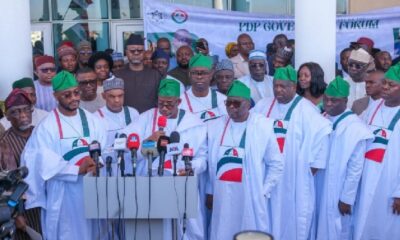
 News21 hours ago
News21 hours agoPDP governors declare support for Tinubu
-

 News24 hours ago
News24 hours agoEx-finance minister rearrested in new fraud probe
-

 News21 hours ago
News21 hours agoHope for Nigerians as Dangote refinery slashes petrol price again
-
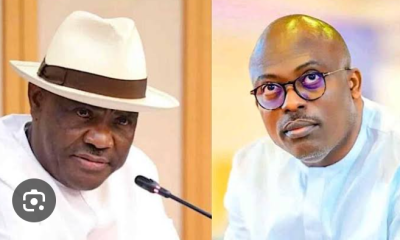
 News24 hours ago
News24 hours agoFubara: How can I forgive somebody who never requested for it– Wike
-

 News21 hours ago
News21 hours agoRivers Emergency Rule: Abbas inaugurates 21-member panel
-
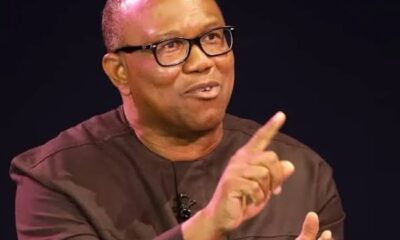
 News23 hours ago
News23 hours agoPeter Obi asks president Tinubu to suspend France trip
-

 News20 hours ago
News20 hours agoN1.3trn CBEX Scam: EFCC caution Nigerians against Ponzi Schemes
-

 News7 hours ago
News7 hours agoFG expresses sympathy for CBEX victims, urges a united effort to combat Ponzi schemes





